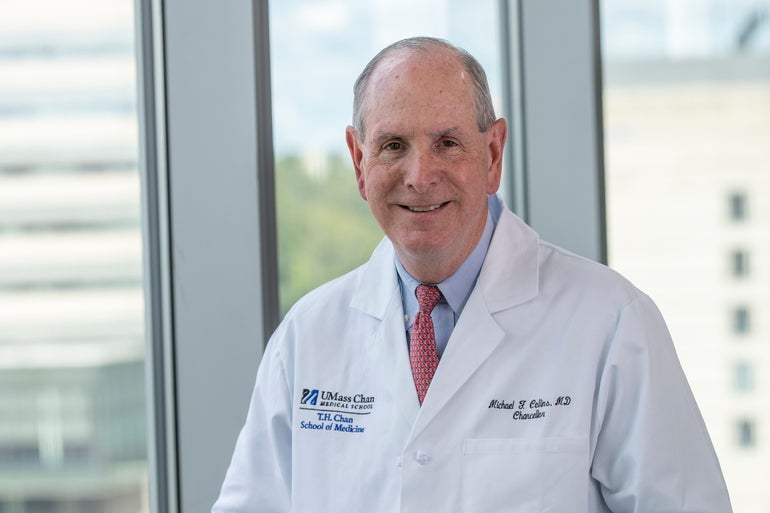UMass and healthcare leaders emphasize UMass Chan’s future success depends on its next chancellor’s ability to cultivate talent, face federal challenges head-on, invest in primary care, and commit to diversity, equity, and inclusion.
Get Instant Access to This Article
Subscribe to Worcester Business Journal and get immediate access to all of our subscriber-only content and much more.
- Critical Central Massachusetts business news updated daily.
- Immediate access to all subscriber-only content on our website.
- Bi-weekly print or digital editions of our award-winning publication.
- Special bonus issues like the WBJ Book of Lists.
- Exclusive ticket prize draws for our in-person events.
Click here to purchase a paywall bypass link for this article.
July 1, 2026 will mark Dr. Michael Collins’ last day as chancellor of UMass Chan Medical School in Worcester, putting a period on the end of an historic 19-year tenure shaping the state’s first and only public medical school.
Announced on June 24, Collins’ upcoming resignation comes as the medical school potentially faces millions in cuts to its National Institutes of Health funding. This deficit, stemming from the President Donald Trump Administration's proposed caps to NIH funding, and additional threats to further slash funding to universities sticking with their diversity, equity, and inclusion initiatives, leaves UMass Chan in a time of financial limbo.
But this federal turmoil had no effect on Collins’ decision to step down.
After celebrating his 70th birthday this year, Collins decided leaving the role at the end of the 2025-2026 academic year would still give him time to be an active and vigorous member of the UMass Chan community, as he intends to stay on as a professor.
“I'll teach. I'll mentor. I'll help raise money. I'll do whatever the new chancellor and the president of the university think could be helpful,” Collins said.
As the Central Massachusetts community reflects on Collins’ legacy and waits to see who will succeed him as the leader one of the region’s anchor institutions, UMass President Marty Meehan and healthcare leaders emphasize UMass Chan’s future success depends on its next chancellor’s ability to cultivate talent, face federal challenges head-on, invest in primary care, and commit to diversity, equity, and inclusion.
“UMass Chan Medical School is the engine that drives the economy of Central Massachusetts by virtue of its employees, by virtue of the amount of money that is spent locally, by virtue of its affiliation with UMass Memorial hospital,” said Meehan, who leads the five-campus University of Massachusetts system, including UMass Chan.
An historic legacy
Collins has stood at the helm of this engine since assuming his chancellor role in an interim capacity in 2007 and then permanently in 2008.
The medical school’s first class graduated 16 doctors in 1974. Now, 50 years later, the incoming class of 2028 at its T.H. Chan School of Medicine is 235, according to data provided by UMass Chan.
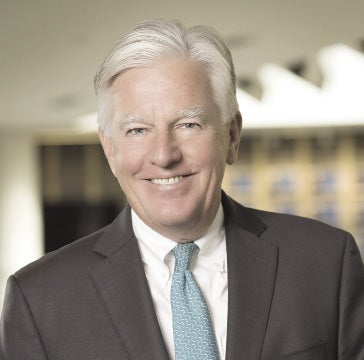
On top of the School of Medicine for would-be doctors, UMass Chan now has graduate schools for nursing and biomedical sciences. UMass Chan’s full-time enrollment in fall 2024 was 1,359, according to data collected by WBJ’s Research Department. Additionally, at that time, the school employed 535 full-time and 3,576 part-time faculty, figures that by far outpaced any other of the 14 colleges and universities in Central Massachusetts.
“No one could have imagined how the medical school has grown or its impact, and from my vantage point, Michael Collins’ fingerprints are on so many of its achievements,” said Meehan.
Throughout his tenure, Collins has raised $865 million for the university, more than any other chancellor in UMass history, Meehan said.
Earlier this year, Collins secured $35 million, the third-largest donation in the UMass system’s history, from the Florida-based Paul J. DiMare Foundation to support the school’s research into neurodegenerative and genetic diseases, particularly ALS. The university has subsequently named its $350-million, 350,000-square-foot research building in DiMare’s honor.
That came after Collins secured the largest donation in the history of the UMass system in 2021, when The Morningside Foundation donated $175 million. That resulted in the entire medical school and its three graduate schools being named after the Chan family of Hong Kong.
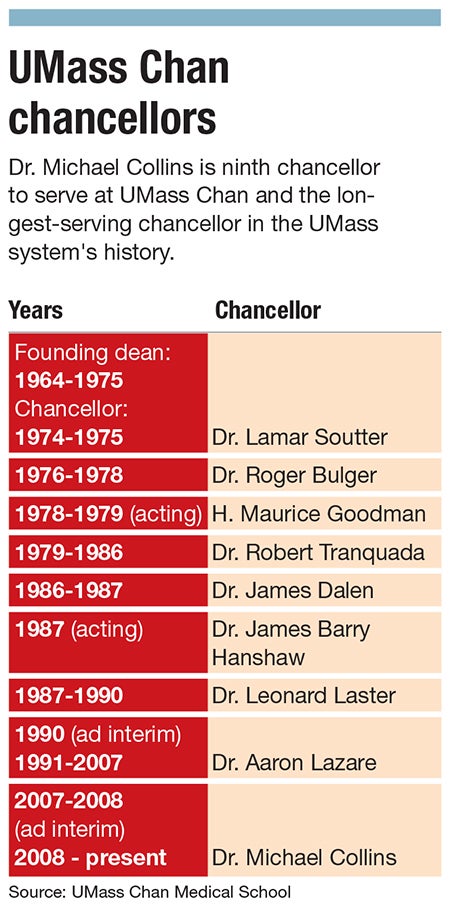
But these kinds of fiscal accomplishments don’t catch Collins’ eye when he looks over his 18 years at UMass Chan. Instead, he sees the faculty and students he has helped attract to its campus as some of his most career-defining achievements.
“If we didn't have great people here, if we didn't have very committed faculty, if we didn't have outstanding learners, if we didn't have a committed staff, people wouldn't invest in us. I mean, that's just the reality,” said Collins.
Of note, UMass Chan is home to two Nobel Prize-winning scientists: in 2006, Craig Mello shared the Nobel Prize in Physiology or Medicine for the discovery of RNA interference with scientist Andrew Fire of Stanford University School of Medicine in California. In 2024, Victor Ambros shared the same prize with Gary Ruvkun of Massachusetts General Hospital for their co-discovery microRNA.
“The faculty is the strength of UMass Medical School,” said Meehan.
Attracting and retaining this kind of talent is going to be essential for the next chancellor, Meehan said, noting Collins has been directly responsible for procuring gifts that have established 55 new endowed chairs, bringing the school’s total to 82.
In 2001, one woman held an endowed chair. Now there are 26.
“The institution’s commitment to diversity, equity, and inclusion is important especially in this moment in time, and to have such a recognized institution and leader in Central Massachusetts helps elevate the region as a whole and advance regional equity,” said Amie Shei, president and CEO of The Health Foundation of Central Massachusetts, located in Worcester.
Prioritizing primary care
As the leader of UMass Chan, the school’s next chancellor will be in a unique position to not only generate change within the university’s walls, but throughout the region’s healthcare landscape, Shei said.
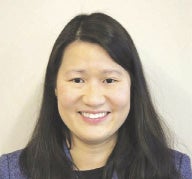
“It's a role that has incredible power and influence. It sets the tone for a lot of what happens in Central Massachusetts,” she said.
One way in which the school’s incoming chancellor can drive diverse and equitable change is through UMass Chan’s primary care physician training, she said.
UMass Chan has been a leader in Central Massachusetts when it comes to training the next generation of primary care providers, an especially important focus now since Massachusetts is facing a primary care shortage, said Dr. Olivia Liao, president of the Massachusetts Medical Society and ophthalmologist at Lexington Eye Associates.
“Without a good primary care, the healthcare system really won't be robust,” said Liao.
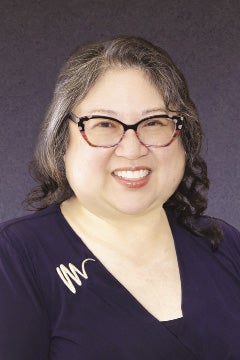
A 2024 study from the Texas-based Cicero Institute classified Worcester County as a health professional shortage area, meaning the region had 3,500 or more patients for every one provider.
A report published in January by Massachusetts Health Policy Commission found between 2018 and 2022, the share of primary care providers who were physicians dropped from 74% to 69%, and in 2021, only one in seven new physicians in the state entered primary care.
Furthermore, 74% of Massachusetts physicians were white in 2022 while 15.9% were Asian/Pacific Islander, 5% were Hispanic, and 1.2% were Black.
UMass Chan was named one of the top 15 best graduate medical schools for primary care in the country for 2024 by U.S. News & World Report and the first in the Northeast.
It’s pivotal the university keeps its commitment to bolstering the primary care workforce, Shei said.
“It will be important that the person maintains a commitment to diversity, equity, and inclusion. We need our healthcare professionals to reflect the communities that they serve,” said Shei. “It's important for patients throughout the region to have access to primary care providers that they trust, that they can access in times of need, otherwise, they may defer care.”
When patients defer care, they show up to our emergency departments with acute conditions that in turn contribute to long ER wait times and clogged emergency departments, systemic issues impacting the health of entire communities, Shei said.
The incoming chancellor must continue to address these issues, she said.
In March, UMass Chan formed its Advancing DEI Working Group under the auspices of Marlina Duncan, vice chancellor for diversity and inclusion.The working group’s formation was in response to Trump’s Feb. 14 threat to potentially cut off federal funding to U.S. colleges that continue with their DEI initiatives. The group is tasked with ensuring all policies, programs, and activities are up to date and compliant with current federal and state law.
“As the commonwealth’s only public academic health sciences campus, we are committed to our mission to advance the health and wellness of our diverse communities throughout Massachusetts and across the world by leading and innovating in education, research, health care delivery and public service,” Collins and Provost and Dean Dr. Terence Flotte wrote in a March 6 memo to the UMass Chan community.
Opportunities and challenges
UMass Chan’s next chancellor will step into a healthcare landscape that is two-fold, said Liao.
“[It’s] going to be challenging, but at the same time exciting, if you think about what could happen,” she said.
As healthcare rapidly embraces artificial intelligence, the university’s next chancellor will have the opportunity to embrace the tool while making sure its uses and implications are ethical and equitable in order to better patient care, diagnoses, and therapeutics, while decreasing administrative tasks, Liao said.
“We really can be at the forefront in this state to help shape AI, to help reduce burnout, so that we can actually build back workforce. Ultimately, the goal is to build that workforce,” she said.
Just as urgently, she foresees one of the incoming chancellor’s greatest challenges will be navigating fiscal concerns on a federal level.
“We also need someone that is a strong advocate in these very challenging times. We need someone that is an advocate at the local, state, and federal level, advocating for funding for these critical medical programs,” said Shei.
With UMass Chan at risk of a $30-million shortfall this year from proposed cuts to NIH funding, it’s no small task.
The next chancellor “needs to be someone who can be a trusted partner and bring stability during this challenging time,” said Shei.
UMass will deploy a national, possibly international, search to find Collins’ successor and bring the best person to Worcester, said Meehan. Embedding the university’s new chancellor into the Central Massachusetts community will be imperative to their ability to meet the needs of its community as Collins has.
“You can't pick a chancellor of any institution, let alone a world class medical school, without getting input from the people who have built this medical school into what it is today,” said Meehan.
Mica Kanner-Mascolo is a staff writer at Worcester Business Journal, who primarily covers the healthcare and diversity, equity, and inclusion industries.
